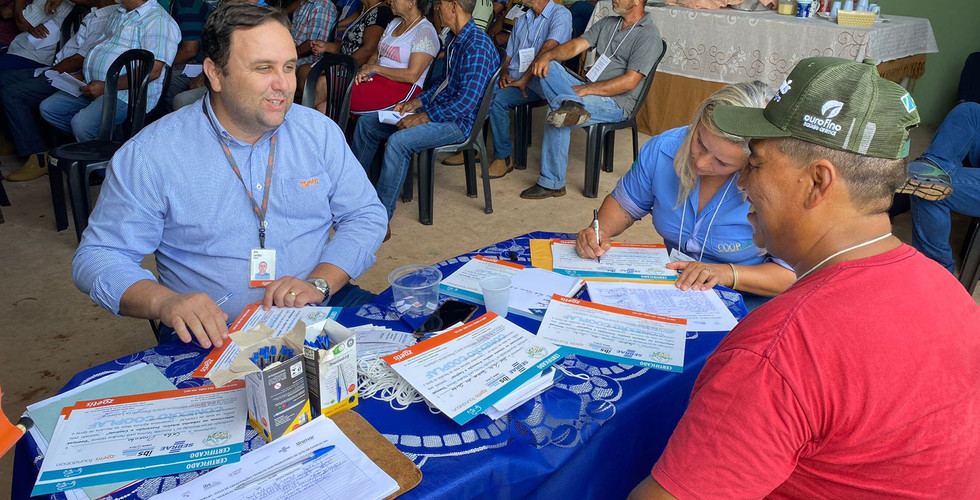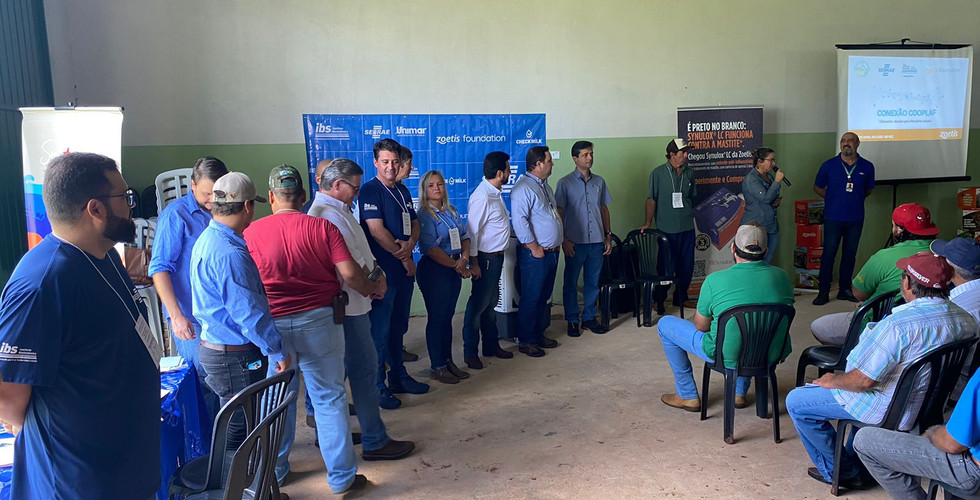Cooplaf Milk Project starts cycle of trainings on good dairy farming practices
- Regina Groenendal
- Mar 28, 2023
- 3 min read

Promoting knowledge about good dairy herd management practices in the areas of animal reproduction and health is the objective of the Cooplaf Connection, a cycle of technical training sessions promoted under the Cooplaf Leite Project, in partnership with the Instituto BioSistêmico (IBS), Sebrae MS, and Zoetis Animal Health from Campo Grande/MS.
"Infectious Diseases in the Dairy Herd: Prevention and Control" was the theme of the first training session held on March 16, conducted by Zoetis Animal Health consultants at the headquarters of the Mixed Agricultural Cooperative of Beef and Dairy Cattle and Family Agriculture (Cooplaf) in Terenos/MS.
The meeting was attended by 76 cooperative producers, as well as representatives from Sebrae MS and the IBS team. The morning session featured a theoretical presentation, while the afternoon session consisted of practical demonstrations with questions and answers.

"Throughout this year, we will hold a total of five training sessions as part of the satellite actions of the Cooplaf Leite Project aimed at engaging young people and women," says veterinarian Matheus Henrique Magalhães, IBS consultant working on the project, who was responsible for coordinating the event with the partners involved.
According to Matheus, the theme of the first meeting was timely because the IBS presented the results of the leptospirosis serological survey on that occasion. He adds that the event was very productive and had a positive response from the participating producers, which brings expectations that the next meetings will have an even larger audience.
"In this collective action, which brought theory and practice, we were able to approach the language of the producers to show examples of what happens outside their property, bringing contexts from other regions of Brazil, in the reality of family farming. In addition, it was an important moment of integration among cooperative producers, with a rich exchange of experiences," evaluates Matheus Henrique. Opportunity for learning
For producer Célia Maria Pimenta, it was an opportunity to learn and clarify doubts about issues she faces on a daily basis when dealing with the dairy herd. She states that the support of the IBS team in the Cooplaf Milk Project has contributed to implementing improvements on her property and that collective training sessions like the Cooplaf Connection are an important reinforcement for her knowledge.
Producer Altair Ferreira guarantees that the activity was productive and allowed for good integration among producers. "It was an excellent presentation that clarified many doubts I had about vaccines to prevent diseases and how to improve the health of cows," reports the producer.

"Acquiring knowledge is liberation. We have seen the process of evolution of producers from the work carried out in the Cooplaf Leite Project and trainings like this one are fundamental, as it is the moment when producers are in contact with other experiences. It is an opportunity for producers to broaden their horizon on dairy farming, understand what other properties are doing and what can be done to improve their property," emphasizes Lucilha de Almeida, 1st secretary of Cooplaf.
The next training sessions are scheduled for the months of May, July, September, and November, with the themes "Herd Parasite Management: Prevention and Control," "Milking Management and Mastitis Control in Cows," and "Reproductive Management."
About the project
The Cooplaf Leite Project was conceived by the Instituto BioSistêmico with the main objective of promoting the development of dairy farming among the cooperative members of the Cooperativa Agrícola Mista da Pecuária de Corte e Leiteira and Agricultura Familiar (Cooplaf), an entity headquartered in the municipality of Terenos, in state of Mato Grosso do Sul, in the Center-West region of Brazil.
Executed by IBS, the initiative has the support of resources from the Zoetis Foundation and the Brazilian Support Service for Micro and Small Enterprises (Sebrae) in the state of Mato Grosso do Sul. It also receives institutional and academic support from Unimar – University of Marília.
This is another livestock project carried out by the Instituto BioSistêmico that uses the CheckMilk methodology, which has a platform with a management system and application for technical teams and producers. The system facilitates project management and the application helps the producer on a daily basis, as an extension of the IBS consultancy that can be accessed at any time in the palm of the hand.




















Comments